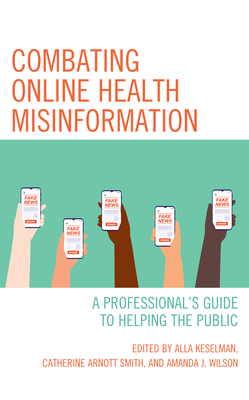Combating Online Health Misinformation: A Professional's Guide to Helping the Public

Combating Online Health Misinformation: A Professional's Guide to Helping the Public
Danger of health misinformation online, long a concern of medical and public health professionals, has come to the forefront of societal concerns during the COVID-19 pandemic. Regardless of their motives, creators and sharers of misinformation promote non-evidence-based health advice and treatment recommendations, and often deny health methods, measures, and approaches that are supported by the best evidence of the time. Unfortunately, many infrastructural, social, and cognitive factors make individuals vulnerable to misinformation. This book aims to assist information and health professionals and educators with all phases of information provision and support, from understanding users' information needs, to building relationships, to helping users verify and evaluate sources. The book can be used as a textbook in library and information science programs, as well as nursing, communication, journalism, psychology, and informatics programs. The book, written from the e-health literacy perspective, is unique in its nuanced approach to misinformation. It draws on psychology and information science to explain human susceptibility to misinformation and discusses ways to engage with the public deeply and meaningfully, fostering trust and raising health and information literacy. It is organized into three parts. Part I: The Ecology of Online Health Information' overviews the digital health information universe, showing that misinformation is prevalent, dangerous, and difficult to define. Part II: Susceptibility to Misinformation: Literacies as Safeguards addresses factors and competencies that affect individual vulnerability and resilience. Part III: Solutions focuses on education and community engagement initiatives that help the public locate and evaluate health information. Chapters within the three Parts discuss technological innovation and social media as posing novel risks as well as presenting novel solutions to helping the public connect with high quality information and building trusting relationships among the public and information and health professionals.
PRP: 377.91 Lei
Acesta este Prețul Recomandat de Producător. Prețul de vânzare al produsului este afișat mai jos.
340.12Lei
340.12Lei
377.91 LeiLivrare in 2-4 saptamani
Descrierea produsului
Danger of health misinformation online, long a concern of medical and public health professionals, has come to the forefront of societal concerns during the COVID-19 pandemic. Regardless of their motives, creators and sharers of misinformation promote non-evidence-based health advice and treatment recommendations, and often deny health methods, measures, and approaches that are supported by the best evidence of the time. Unfortunately, many infrastructural, social, and cognitive factors make individuals vulnerable to misinformation. This book aims to assist information and health professionals and educators with all phases of information provision and support, from understanding users' information needs, to building relationships, to helping users verify and evaluate sources. The book can be used as a textbook in library and information science programs, as well as nursing, communication, journalism, psychology, and informatics programs. The book, written from the e-health literacy perspective, is unique in its nuanced approach to misinformation. It draws on psychology and information science to explain human susceptibility to misinformation and discusses ways to engage with the public deeply and meaningfully, fostering trust and raising health and information literacy. It is organized into three parts. Part I: The Ecology of Online Health Information' overviews the digital health information universe, showing that misinformation is prevalent, dangerous, and difficult to define. Part II: Susceptibility to Misinformation: Literacies as Safeguards addresses factors and competencies that affect individual vulnerability and resilience. Part III: Solutions focuses on education and community engagement initiatives that help the public locate and evaluate health information. Chapters within the three Parts discuss technological innovation and social media as posing novel risks as well as presenting novel solutions to helping the public connect with high quality information and building trusting relationships among the public and information and health professionals.
Detaliile produsului













